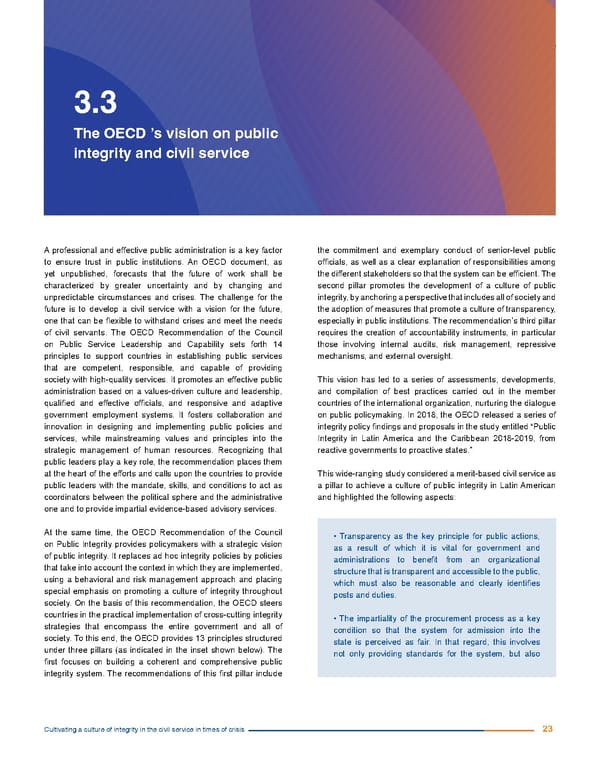3.3 The OECD ’s vision on public integrity and civil service A professional and effective public administration is a key factor the commitment and exemplary conduct of senior-level public to ensure trust in public institutions. An OECD document, as officials, as well as a clear explanation of responsibilities among yet unpublished, forecasts that the future of work shall be the different stakeholders so that the system can be efficient. The characterized by greater uncertainty and by changing and second pillar promotes the development of a culture of public unpredictable circumstances and crises. The challenge for the integrity, by anchoring a perspective that includes all of society and future is to develop a civil service with a vision for the future, the adoption of measures that promote a culture of transparency, one that can be flexible to withstand crises and meet the needs especially in public institutions. The recommendation’s third pillar of civil servants. The OECD Recommendation of the Council requires the creation of accountability instruments, in particular on Public Service Leadership and Capability sets forth 14 those involving internal audits, risk management, repressive principles to support countries in establishing public services mechanisms, and external oversight. that are competent, responsible, and capable of providing society with high-quality services. It promotes an effective public This vision has led to a series of assessments, developments, administration based on a values-driven culture and leadership, and compilation of best practices carried out in the member qualified and effective officials, and responsive and adaptive countries of the international organization, nurturing the dialogue government employment systems. It fosters collaboration and on public policymaking. In 2018, the OECD released a series of innovation in designing and implementing public policies and integrity policy findings and proposals in the study entitled “Public services, while mainstreaming values and principles into the Integrity in Latin America and the Caribbean 2018-2019, from strategic management of human resources. Recognizing that reactive governments to proactive states.” public leaders play a key role, the recommendation places them at the heart of the efforts and calls upon the countries to provide This wide-ranging study considered a merit-based civil service as public leaders with the mandate, skills, and conditions to act as a pillar to achieve a culture of public integrity in Latin American coordinators between the political sphere and the administrative and highlighted the following aspects: one and to provide impartial evidence-based advisory services. At the same time, the OECD Recommendation of the Council • Transparency as the key principle for public actions, on Public Integrity provides policymakers with a strategic vision as a result of which it is vital for government and of public integrity. It replaces ad hoc integrity policies by policies administrations to benefit from an organizational that take into account the context in which they are implemented, structure that is transparent and accessible to the public, using a behavioral and risk management approach and placing which must also be reasonable and clearly identifies special emphasis on promoting a culture of integrity throughout posts and duties. society. On the basis of this recommendation, the OECD steers countries in the practical implementation of cross-cutting integrity • The impartiality of the procurement process as a key strategies that encompass the entire government and all of condition so that the system for admission into the society. To this end, the OECD provides 13 principles structured state is perceived as fair. In that regard, this involves under three pillars (as indicated in the inset shown below). The not only providing standards for the system, but also first focuses on building a coherent and comprehensive public integrity system. The recommendations of this first pillar include Cultivating a culture of integrity in the civil service in times of crisis 23
 Cultivating a culture of integrity in the civil service in times of crisis. Page 30 Page 32
Cultivating a culture of integrity in the civil service in times of crisis. Page 30 Page 32